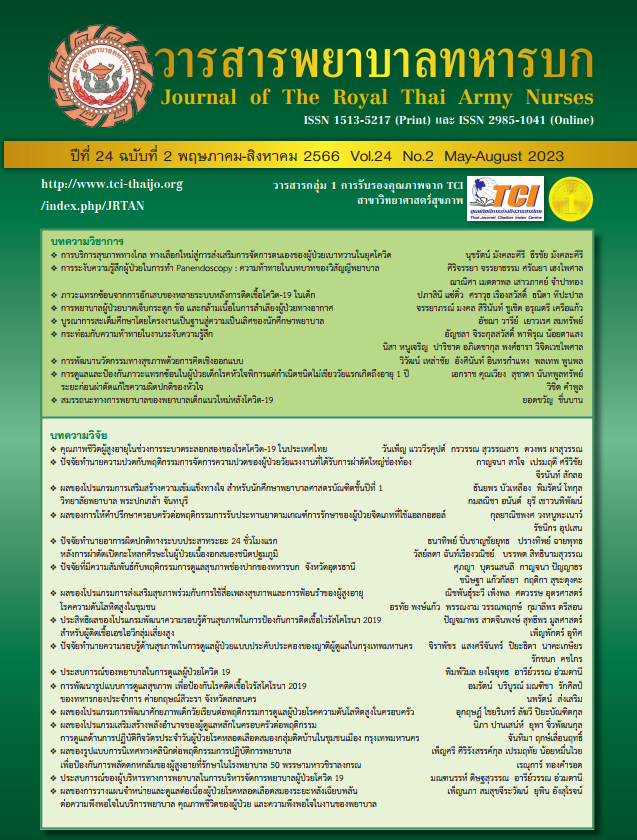Relationships Between Personal Factors, Safety Climate, Social Support, Feedback, and Work Safety Behaviors of Professional Nurses in Tertiary Hospitals
Keywords:
work safety behaviors, personal factors, safety climate, social support, feedbackAbstract
The descriptive research design aimed to examine the relationships between personal factors, safety climate, social support, feedback and work safety behaviors. The samples were 115 professional nurses, randomly selected by multi-stage sampling technique. The research instruments were personal factors, safety climate, social support, feedback, and work safety behaviors questionnaires. Content validity and reliability were established. The Cronbach’s alpha coefficients were .83, .96, .96, and .96, respectively. The data were analyzed by using frequency, percentage, mean, standard deviation, and Pearson’s product moment correlation.
Major findings of this study were as follows:
1. Work safety behavior of professional nurses in tertiary hospitals was at the good level ( = 4.47, SD = 0.35).
2. The relationship between personal factor which is the work unit and work safety behavior of professional nurses in tertiary hospitals was statistically significant (χ2=20.93, p< .05). The relationship between personal factor which is work experience and work safety behaviors of professional nurses in tertiary hospitals were positively statistically significant (r = .255, p<.05).
3. The relationships between safety climate, social support, feedback and work safety behavior of professional nurses in tertiary hospitals were positively statistically significant (r = .737, r = .660, and r = .926, p<.05, respectively).
Downloads
References
Opastiragul W. Health status related to risk at work among professional nurses, out patient and emergency nursing section, Maharaj nakorn chiang mai hospital. Nursing Journal. 2015; 42(2): 49-61. (in Thai)
Khunthar A. The impacts and solutions to nursing workforce shortage in Thailand. Journal of Nursing Science. 2014; 32(1): 81-90. (in Thai)
Suriyawong W. Organizational safety culture and compliance with safety practices among registeres nurses at a tertiary care hospital. Journal of Communication Health Development Quarterly Khon Kean University. 2017; 5(1): 103-18. (in Thai)
Chalok-kongthavorn C. A study of work safety behaviors of professional nurses, Government university hospital. (Thesis). Bangkok: Chulalongkorn University; 2017. (in Thai)
Pumfang S. Factors of job stress for professional nurses in tertiary hospital. Kuakarun Journal of Nursing. 2015; 22(2): 140-53. (in Thai)
Sawasrak K. Barriers to and facilitators prevention practices among professional nurse in tertiary care hospitals. Nursing Journal. 2015; 42(4): 25-35. (in Thai)
Ramkaew K. Working experience of emergency nurses in tertiary care hospital. Journal of Royal Thai Army Nurses. 2014; 15(3): 226-34. (in Thai)
Zohar D. Safety climate in industrial organization: theoretical and applied implication. Journal of Applied Psychology. 1980; 65: 96-102.
Kines, P. et al. Nordic Safety Climate Questionnaire (NOSACQ-50): A new tool for diagnosing occupational safety climate. International Journal of Industrial Ergonomics. 2011; 41(6): 634-46.
Pender, N. J. Health promotion in nursing practice. 2nd ed. Norwalk, Conn.: Appleton & Lange; 1987.
Hackman, J. R., & Oldham, G. R. Work redesign. Reading, MA: Addison-Wesley; 1980.
Griffin MA, Neal A. Perception of safety at work: A framework for linking safety climate to safety performance, knowledge, and motivation. Journal of occupational health psychology. 2000; 5:347-58.
Parker S, Axtell C, Turner N. Designing a safer workplace: Importance of job autonomy, communication quality, and supportive supervisors. Journal of occupational health psychology. 2001; 6: 211-28.
Karasek, R. & Theorell, T. Healthy work: Stress, productivity and the reconstruction of working life. New York: Basic books; 1990.
Liangkobkit C. Relationships between personal factors, work endeavor, social support, and job stress in professional nurses, private hospitals, Bangkok Metropolis. (Thesis). Bangkok: Chulalongkorn University; 2010. (in Thai)
Chaleoykitti S. Effects of empowerment program by head nurses on performance feedback and job satisfaction of staff nurses. (Thesis). Bangkok: Chulalongkorn University; 2001. (in Thai)
Pooput O. Work safety behaviors of registered nurse in queen Sirikit heart center of the northeast. Journal of Mahasarakham Hospital. 2019; 16(3): 188-96. (in Thai).
Boonbumroe S. Work safety behaviors of nurse in Maharat nakhon ratchasima hospital. The Journal of Boromarajonani College of Nursing, Nakhonratchasima. 2014; 20(2): 82-92. (in Thai)
Boonbumroe S. Work safety behaviors of nurse in Maharat nakhon ratchasima hospital. The Journal of Boromarajonani College of Nursing, Nakhonratchasima. 2014; 20(2): 82-92. (in Thai)
Thongma P. Factors predicting health of professional nurse in the government university hospital. (Thesis). Bangkok: Chulalongkorn University; 2016. (in Thai)
Krungkraipetch N. Factors affecting safety behavior in nursing practice among nursing students in the eastern region. Journal of Prapokklao Hospital Clinical Medical Education Center. 2019; 36(6): 193-201. (in Thai).
Kaewtawee A. Relationships between work-life balance, safety climate and organizational commitment of professional nurse, private hospitals, southern region. Journal of The Royal Thai Army Nurses. 2014; 15(3): 313-20. (in Thai)
Oh E, Choi JS. Factors influencing the adherence of nurses to standard precautions in South Korea hospital settings. American Journal Infection Control. 2019; 47(11): 1346-51.
Khumhome B. The Effects of Negative Feedback on Intention to Improve Efficiency of Job and Work Performance of Generation Y. Humanities, Arts and Social Sciences Studies. 2019; 19(3): 628-48. (in Thai)
Chansa S. The effects of effective communication and teamwork on patient safety management of staff nurses at one government hospital in bangkok metropolis. Journal of The Royal Thai Army Nurses. 2017;18 (Supplement): 299-307. (in Thai)
Downloads
Published
How to Cite
Issue
Section
License
Copyright (c) 2023 Journal of The Royal Thai Army Nurses

This work is licensed under a Creative Commons Attribution-NonCommercial-NoDerivatives 4.0 International License.
บทความหรือข้อคิดเห็นใดใดที่ปรากฏในวารสารพยาบาลทหารบกเป็นวรรณกรรมของผู้เขียน ซึ่งบรรณาธิการหรือสมาคมพยาบาลทหารบก ไม่จำเป็นต้องเห็นด้วย
บทความที่ได้รับการตีพิมพ์เป็นลิขสิทธิ์ของวารสารพยาบาลทหารบก
The ideas and opinions expressed in the Journal of The Royal Thai Army Nurses are those of the authors and not necessarily those
of the editor or Royal Thai Army Nurses Association.






